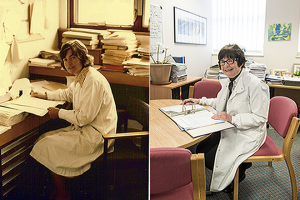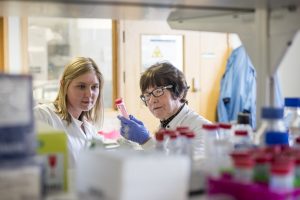World-leading immunologist Professor Freda Stevenson will be recognised by The American Society of Hematology (ASH) with the 2018 Henry M. Stratton Medal for her seminal contribution to haematology research.
Professor Stevenson, who is based at the Centre for Cancer Immunology, has been at the forefront of cancer immunology research for over 40 years. She has led, shaped and continues to pioneer┬Āgroundbreaking research in understanding how to engage the immune system in the┬Āfight against lymphoma, for which Southampton is now widely recognised.
In the 1970s Professor Stevenson, alongside George Stevenson, were among the first scientists to publish work describing the concept that the immune system could be steered towards fighting cancer.
She is being honoured alongside Brunangelo Falini MD of the University of Perugia and the Institute of Haematology and Bone Marrow Transplantation in Italy. The Medal is named after the late Henry Maurice Stratton, co-founder of Grune and Stratton, the medical publishing house that first published ASHŌĆÖs journal Blood.
ŌĆ£It is a pleasure to be recognized by the ASH community,ŌĆØ said Professor Stevenson. ŌĆ£Research in basic science continues to underpin clinical progress, and I am proud to have contributed to this interface in haematology.ŌĆØ

Professor Stevenson is recognised for her pioneering work in the biology of B-cell malignancies, such as lymphoma and chronic lymphocytic leukemia (CLL). She is credited with numerous contributions to the field, including the discovery that CLL consists of two significantly different subsets, one of which is associated with more rapid disease progression. This knowledge currently serves as a major indicator of prognosis and has also offered targets for drug therapies that are now demonstrating clinical efficacy. The publication of this work has been cited 1,886 times and earned Professor Stevenson the Rai-Binet Medal from the International Workshop on Chronic Lymphocytic Leukaemia.
Professor was also the first to propose and test an anti-CD38 monoclonal antibody treatment for patients with multiple myeloma, the results of which were published in Blood and formed the preliminary basis for the development of the drug that is today known as daratumumab. Her other notable contributions include the discovery of a lymphoma-specific sugar target or ŌĆ£Achilles heelŌĆØ of follicular lymphoma on B-cell receptors, which may be a target for future therapy. Professor Stevenson also designed gene-based vaccines that work against tumor antigens to help provide long-term protection against cancer relapse. While initially used to treat lymphoma, this strategy is now being tested in solid tumors. For this work, Professor Stevenson was awarded the European Hematology AssociationŌĆÖs Jean Bernard Lifetime Achievement Award.
ŌĆ£The discoveries contributed by these two dedicated researchers have exponentially improved the specificity with which we can diagnose and care for our patients with hematologic malignancies,ŌĆØ said ASH President Alexis Thompson, MD, MPH, of the Ann and Robert H Lurie ChildrenŌĆÖs Hospital of Chicago. ŌĆ£I am honored to present Professor Stevenson and Dr Falini with the Henry M. Stratton Medal.ŌĆØ
Professor Stevenson and Dr Falini will accept their awards in December during the 60th ASH Annual Meeting and Exposition in San Diego, California, USA.
Our Q&A with Professor Stevenson can be found here.
